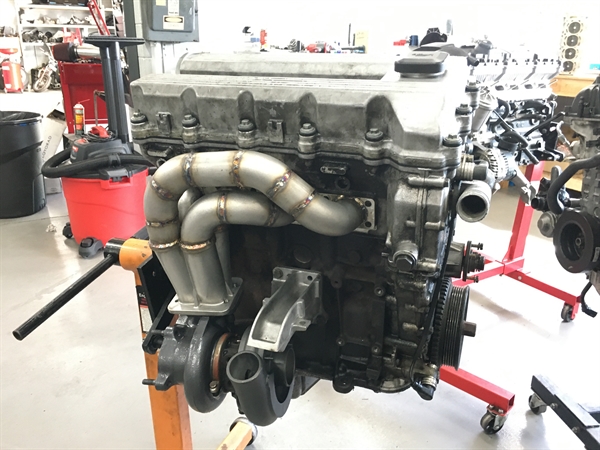BMW 318ti: Efficiency Specs and Characteristics Explained
Wiki Article
Secret Attributes to Try To Find When Getting an Engine for Automotive Applications
When taking into consideration the acquisition of an engine for vehicle applications, numerous key attributes warrant cautious evaluation to ensure optimum efficiency and functionality. From power and efficiency capacities to fuel adherence, efficiency, and resilience to discharges requirements, each aspect plays a vital duty in identifying the engine's suitability for details auto requirements. Moreover, cost-effectiveness stays a crucial aspect in the decision-making process, stabilizing top quality with monetary considerations. These features collectively add to the overall effectiveness and dependability of the engine, influencing the driving experience and long-term satisfaction of the customer.Power and Performance
When choosing an automobile engine, buyers prioritize power and performance to make sure ideal driving experience and effectiveness. The power result of an engine, commonly determined in horsepower (HP) or kilowatts (kW), dictates the acceleration, full throttle, and overall capacities of a car. Greater power rankings typically lead to quicker acceleration and far better performance, specifically during surpassing or carrying hefty lots. Efficiency, on the various other hand, incorporates a more comprehensive spectrum of characteristics, consisting of gas efficiency, exhausts, dependability, and general driving characteristics. A well-performing engine not only provides power effectively yet also runs smoothly across different speed arrays and driving problems.In addition, aspects such as engine displacement, hybrid, and turbocharging technologies play considerable functions in boosting both power and efficiency levels. Eventually, choosing an engine that offers a potent mix of power and efficiency makes sure a rewarding and effective driving experience.
Gas Efficiency
Enhancing gas effectiveness is a vital factor to consider for customers when examining automobile engine options. Modern engines with features like straight fuel injection, turbocharging, and variable shutoff timing can dramatically enhance fuel effectiveness by improving burning procedures and decreasing power loss.

Resilience and Integrity
Attaining long-lasting efficiency and trustworthy operation is vital for customers examining the durability and dependability of automobile engines. When considering an engine for automobile applications, resilience describes the engine's capacity to hold up against wear, stress, and rough operating conditions over a prolonged duration. Dependability, on the other hand, suggests that the engine can regularly execute its intended function without unforeseen malfunctions or failings.Customers should search for engines constructed with high-quality materials and specific engineering to ensure durability. Components such as pistons, crankshafts, and bearings should be resilient to manage the engine's power outcome without premature wear. In addition, engines outfitted with sophisticated cooling systems, efficient lubrication, and durable purification devices often tend to display greater degrees of dependability.
Routine upkeep and adherence to supplier suggestions are also essential aspects in preserving an engine's sturdiness and integrity. By complying with maintenance routines, making use of advised liquids, and addressing any type of concerns without delay, consumers can maximize the life expectancy and efficiency of their auto engines. Ultimately, prioritizing toughness and reliability in engine selection can cause a much more satisfying ownership experience with fewer unexpected disruptions.
Exhausts Compliance
Making sure compliance with exhausts policies is a crucial aspect of evaluating auto engines for eco mindful consumers. With raising issues regarding air quality and ecological influence, rigorous emissions requirements have been established worldwide to minimize harmful pollutants launched right into the atmosphere. When purchasing an engine for vehicle applications, it is necessary to consider its emissions compliance to important site reduce the carbon footprint and abide by legal needs.Modern engines are outfitted with innovative exhaust control modern technologies such as catalytic converters, exhaust gas recirculation (EGR) systems, and discerning catalytic decrease (SCR) to minimize dangerous exhaust gases like nitrogen oxides (NOx), carbon monoxide gas (CARBON MONOXIDE), and hydrocarbons (HC) These systems play an important role in making sure that the engine meets the defined exhausts criteria and runs within acceptable limitations.

Cost-effectiveness
When considering automobile engine purchases, reviewing cost-effectiveness is extremely important for customers seeking both efficiency and value. It includes the total expenses related to maintenance, fuel consumption, and potential repairs over the engine's life-span.One key element of cost-effectiveness is fuel effectiveness. Engines that are designed to optimize gas economy can result in significant cost savings over time, specifically for individuals that drive regularly or over long ranges. Furthermore, taking into consideration the schedule and price of spare parts and maintenance can add to the overall cost-effectiveness of an engine. Making certain that repair and maintenance are accessible and practical can protect against unanticipated monetary concerns down the line.

Verdict
To conclude, when purchasing an engine for automobile applications, it is crucial to consider crucial functions such as power and efficiency, fuel reliability, resilience and performance, discharges conformity, and cost-effectiveness. These variables are necessary in ensuring that the engine satisfies the requirements of the vehicle and operates effectively in various driving problems - bmw 318ti. Making an educated choice based upon these criteria will inevitably lead to a successful and reliable automobile engine acquisitionFrom power and performance capabilities to read fuel efficiency, longevity, and adherence to discharges criteria, each aspect plays an essential duty in identifying the engine's viability for certain auto demands. Engines designed to run on alternate fuels such as electrical power, hybrid systems, or biofuels can provide better fuel economy and lower discharges compared to typical gas or diesel engines. Customers need to carefully consider the fuel efficiency ratings and technologies incorporated right into automobile engines to make enlightened purchasing choices that straighten with their priorities for cost financial savings and sustainability.
When thinking about an engine for automobile applications, longevity refers to the engine's capacity to withstand wear, tension, and rough operating conditions over an extended period.In verdict, when purchasing an engine for vehicle applications, it is essential to take into consideration key attributes such as power and performance, fuel reliability, performance and resilience, discharges conformity, and cost-effectiveness.
Report this wiki page